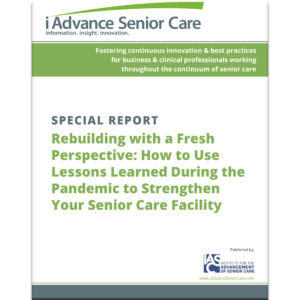CMS backpedals on arbitration restrictions
The Centers for Medicare and Medicaid Services (CMS) is revising its prior rules on the ways long-term care providers can arbitrate disagreements. The agency proposed several revisions to its 2016 final rule, which had banned the use of pre-dispute agreements arbitration requirements and caused a flurry of negative reverberations throughout the provider sector.
The following changes are proposed, noted a CMS announcement late Monday:
- The prohibition on pre-dispute binding arbitration agreements is removed.
- All agreements for binding arbitration must be in plain language.
- If signing the agreement for binding arbitration is a condition of admission into the facility, the language of the agreement must be in plain writing and in the admissions contract.
- The agreement must be explained to the resident and his or her representative in a form and manner they understand, including that it must be in a language they understand.
- The resident must acknowledge that he or she understands the agreement.
- The agreement must not contain any language that prohibits or discourages the resident or anyone else from communicating with federal, state, or local officials, including federal and state surveyors, other federal or state health department employees, or representatives of the State Long-Term Care Ombudsman.
- If a facility resolves a dispute with a resident through arbitration, it must retain a copy of the signed agreement for binding arbitration and the arbitrator’s final decision so it can be inspected by CMS or its designee.
- The facility must post a notice regarding its use of binding arbitration in an area that is visible to both residents and visitors.
The Reform of Requirements for Long-Term Care Facilities Final Rule, published in October 2016, ruffled the feathers of providers, greatly because of its ban on pre-dispute agreements for arbitration. The American Health Care Association/National Center for Assisted Living (AHCA/NCAL) and several provider organizations sued CMS over the ban and were granted an injunction to keep CMS from enforcing that portion of the rule.
Bowing to pressure from providers and judges, CMS is now proposing to “remove provisions prohibiting binding pre-dispute arbitration and strengthen requirements regarding the transparency of arbitration agreements in LTC facilities. This proposal would support the resident’s right to make informed choices about important aspects of his or her healthcare.”
Today’s CMS announcement was a welcome victory, said AHCA/NCAL President and CEO Mark Parkinson, who called last year’s ban on arbitration agreements “an overreach, flying in the face of the Federal Arbitration Act.”
“Arbitration has been proven and tested to be fair and effective,” Parkinson said in an association statement. “Arbitration produces swifter resolution to disputes, compensates residents without undue litigation expense for either party, and reduces the funding burden on the Medicare and Medicaid programs. We greatly appreciate CMS and the Trump Administration making the determination that this ban is not in the best interest of our nation’s millions of patients, residents and families, and the providers who care for them.”

Pamela Tabar was editor-in-chief of I Advance Senior Care from 2013-2018. She has worked as a writer and editor for healthcare business media since 1998, including as News Editor of Healthcare Informatics. She has a master’s degree in journalism from Kent State University and a master’s degree in English from the University of York, England.
Related Articles
Topics: Executive Leadership , Risk Management











